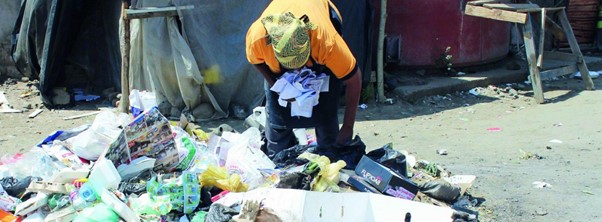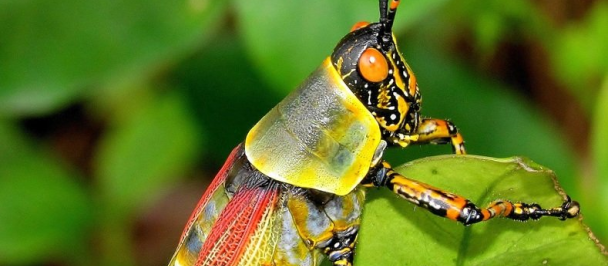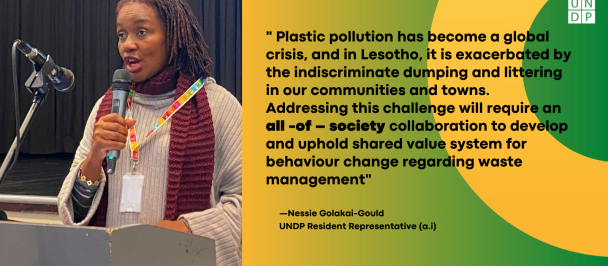Plastic Waste
Lesotho and Eswatini’s economies dependent heavily on the regional economic hub, South Africa, for trade and employment. This is further evidenced by the Common Monetary Area Pegging (CMA)[1] agreement which renders the two countries' local currencies, Loti and Lilangeni at par with the South African Rand. Because of their weak economies, citizens of both countries still heavily depend on subsistence farming for their livelihoods. Regrettably, both countries are grappling with massively growing plastic pollution that has negative impact on agricultural activities, affects the environment and general ecosystem, and thereof, hinders tourism development and foreign investments. In addition, natural resources including ground and surface water sources are at higher risk of plastic contamination, especially from micro-plastic material pollutant. As an exporter of water to South Africa and other Southern African nations, gaining around 3% towards its GDP, water contamination in Lesotho has adverse effects on the country’s natural and economic resource. The current waste management practices are clearly unsustainable.
UNDP Accelerator Labs proposed solution
To assist the two kingdoms in identifying effective solutions to eradicate single-use plastic waste proliferation scourge, UNDP leveraged the power of the Accelerator Lab (AccLab) network that led to a South – South cooperation between Lesotho and Eswatini in the creation of an experiment that is aimed at tackling plastic waste problem. In alignment with the lessons learned from the Phatsa Sakho Nawe plastic campaign in Eswatini which saw consumers’ behavioural change towards single-use plastics, the two labs collaborated in crafting a similar experiment in Lesotho. The objectives of the experiment were to: (a) Reduce the usage of single-use plastics by finding alternative and more sustainable solutions; (b) Reuse and repurpose single-use plastics as they are resistant and versatile; (c) Educate to increase awareness and ignite behavioural change through campaigns, while also identifying plastic alternatives.
Eswatini’s Approach
The Eswatini Accelerator Lab launched its Phatsa Sakho Nawe campaign as part of its “Clean Eswatini Campaign” that is hosted by the Office of the Prime Minister. The campaign built on some of the work that had been done by the Eswatini Environment Authority (EEA) in previous years, including a short experiment undertaken by the organization to introduce a levy of E1 on single-use plastic bags in 2017. This levy was met with much resistance and it had to be suspended within a week of its implementation, at which point a call for the development of Plastic bag regulations to control and manage single-use plastic bags was made. However, the regulations were developed but not approved since 2017, until the initiation of the Phatsa Sakho Nawe Campaign in 2020.
Building on the lessons of this experiment and that of other countries like South Africa which has implemented a plastic regulations for several years[1], the Eswatini UNDP Accelerator Lab begun to work with EEA and 5 major food retailers (namely Pick n Pay, Spar, Shoprite, Boxer and OK Foods) to co-design solutions that were tailored for Eswatini, with thefocus on waste avoidance. After reviewing lessons learned by other countries, the stakeholders agreed that the most preferred method to reduce the use of single-use plastics would be controlling them at the point of distribution by imposing a partial ban that would run on weekends, Friday to Sunday, during the festive season. This campaign was launched by the Minister for Tourism and Environmental Affairs to begin on 4th December 2020 and end on 7th February 2021.
General observations during this period demonstrated acceptance on the part of consumers which led to the campaign’s extension to continue indefinitely while adding more days periodically. Furthermore, the campaign attracted other retailers to come on board. A survey of three main shopping centers in Mbabane revealed that 74% of all types of shops within these shopping centers were participating in the campaign. In addition, another monumental milestone was reached on 10th November 2021, where all five pioneer retailers agreed to ban single-use plastics from their shops.
To date the Eswatini AccLab has drawn some lessons from observations, data, consumers’ and shop assistants’ reflections and social media interactions. These include the following:
· Customers having the willingness to pay a higher price than the proposed 35cents for a single-use plastic. Therefore, the levy will unlikely result in a significant reduction of this consumption. Furthermore, 42% of respondents think that a complete ban is more likely to result in a significant reduction of plastic waste while the 5 experimenting retailers perceived a total ban as being the most likely method to result in change.
· The business sector does not generally participate in sustainable development initiatives because their fundamental focus is profit. However, this experiment has proven that if sustainable development targets are aligned with business interest, then collaboration and commitment is enhanced.
· As observed by retailers, higher income earners are more likely to bring shopping bags than lower income earners. However, during the plastic ban, shops in low-income neighbourhoods showed a spike in the sale of re-usable shopping bags, which could signal a positive impact of the campaign. A decline in the sale of re-usable shopping bags as the campaign progressed was also noted, possibly signalling consumers’ positive adjustment.
· Lastly, opportunities for added incomes were nurtured, as over 120 women were engaged through the Vukani Bomake project to participate in the supply of re-usable shopping bags.
Nevertheless, this campaign has received some setbacks. A major one being resistance from the local and regional plastic producing industry who think that the campaign is a huge threat to their business. Consequently, presenting a threat to the sustainability of the campaign.
Lesotho’s Approach
As part of the global campaign on the ‘Decade of Action’ for SDGs, the UNDP Lesotho Accelerator Lab initiated a plastic free campaign in partnership with the Ministry of Tourism, Environment and Culture (MTEC) and retail stores. The initial plan sought partnership with Pick-n-Pay and Shoprite in order to obtain close control and monitoring of the experiment. A solutions mapping and collective intelligence exercise was held among the stakeholders in order to determine the feasibility of the experiment prior to its commencement, and to also influence the participants to perceive the concept as their own, thus encouraging them to lead the implementation of the experiment. Awareness of the campaign was driven through social media, television, radio and print media displayed in stores. The private sector and consumer associations highly welcomed the initiative.
On 14th July 2021, Lesotho Accelerator Lab launched “Plastic Free Wednesday”, where single-use plastics were not issued to consumers at retail stores on Wednesdays. The major successes of UNDP Lesotho Accelerator experiment include the following:
- The consumer’s acceptance and applause to the long-awaited initiative. Majority of consumers wanted the number of days to be increased and some have even suggested that plastics should be completely banned.
- Another measure of success has been the support from local media houses, NGOs, youths who hosted clean-ups and promoted plastic recyclables, and schools hosting the 2021 Lesotho Science and Mathematics fair around the plastic waste management theme.
- Ministry of Tourism, Environment and Culture in concert with Lesotho Mounted Police, Community policing committees, and the judicial sector have been implementing environmental policing where the public is being held accountable for criminal offences that pollute the environment.
- While this was not one of the objectives of the experiment, some retailers realised an increase in profits based on reusable bags sales in compensation of cost of issuing free single-use plastics.
Through Plastic Free Wednesday experiment concept, UNDP Lesotho managed to mobilise additional resources to the value of $500,000.00 to implement a project which aimed at building partnerships and advocacy on plastic life-cycle management and encourage behavioral change for responsible production and use of plastics in Lesotho. The project main activities include sensitisation and establishment of regulatory and legal frameworks, employment creation and improvement of livelihoods and improvement of government institutions infrastructure.In advent of major successes, the experiment in Lesotho faced some challenges, with retailers refusing to increase the number of days from Wednesday only, citing lack of legal instruments to support non issuance of plastic bags to consumers. This was as a result of some customers who would attack retailers when not being handed plastic bags on Wednesdays shopping. In addition, retailers saw a decline in shopping activity on Wednesdays where some consumers opted not to buy anything on Wednesdays.
Road to Plastic Bag Free Monarchies
Single-use plastics are a major global threat as they take a long time to decompose (+500 years). In Lesotho, a draft levy is yet to be enacted by parliament, while in Eswatini plastic regulations were enacted into law in May 2021, following the awareness raised through the Phatsa Sakho Nawe campaign. Both countries are intending to impose a levy on single-use plastic costing 30-50 cents. From the viewpoints of both Labs, based on the experiments currently underway and a review of other country programs, these regulatory tools are unlikely to serve the intended purpose because in the short-term, they are likely to reduce the single-use plastic consumption, however consumers will become accustomed to paying the low cost of plastic bags and their behavior towards plastic use will revert to the current state. Furthermore, preliminary findings from both experiments show a high willingness from consumers to pay higher amounts than the levies stated in the current Bills/Laws for single-use plastics. Therefore, such levies are unlikely to deter the high distribution of this pollutant. Based on these findings, a total ban is recommended as the best option to effect a reduction in plastic consumption.
Unfortunately, both Monarchs will need to fight a tug-of-war between environmental protection and the livelihoods of those who depend on the plastic value chain. This requires some risk mitigation and adaptation of business model strategies to be developed with these sectors to allow for a smooth transition towards a plastic bag free economy.
There is still a lot of potential to continue experimenting, and for further collaborations between Lesotho and Eswatini to conduct analyses on the consumers user journey and behavioral change insights based on these campaigns. Through grants that both labs have given to Community Based Organisations we believe that they will assist in unearthing more solutions that can be experimented.
A collaboration piece between the Lesotho and Eswatini Acc. Labs
Eswatini:
Zandile Mthembu – Head of Experimentation
Mavie Thwala - Head of Exploration
Nontobeko Mlangeni – Head of Solutions Mapping
Lesotho:
Lebesa Nkune – Head of Solutions Mapping
Teboho Khoali – Head of Experimentation
Neo Matsoso – Head of Exploration
[1] https://www.centralbank.org.ls/images/Publications/Research/Reports/MonthlyEconomicReviews/2010/Econo_Reveiw_Octr_2010.pdf
[2] http://sawic.environment.gov.za/documents/1726.pdf

 Locations
Locations


